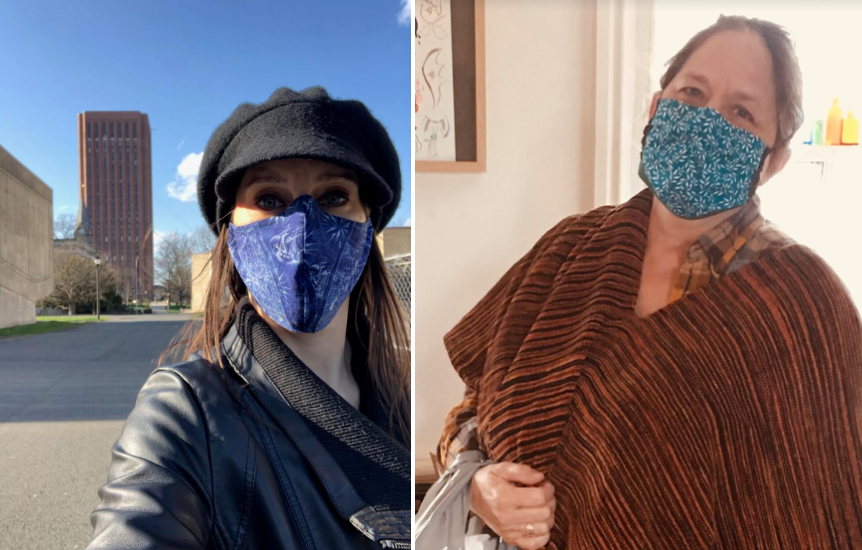The University of Massachusetts Department of Theater’s Costume Shop is making and distributing hundreds of cloth masks to high risk workers throughout Western Massachusetts alongside a larger community of mask makers combating shortages during the coronavirus pandemic.
“It’s a really good feeling of everybody pitching in and I think that’s an interesting aspect of this […] to see so many people recognizing the various needs and doing what they can do to help out their community,” said Costume Shop Manager Kristin Jensen. “If I have fabric sitting here at home and sewing machines and the ability to do it, it’s like I can’t imagine what I’d be doing with my time that would feel better than making masks.”
Jensen and Assistant Costume Shop Manager Felicia Malachite started this project in the third week of March, when theater productions on campus were postponed due to the shift to remote learning and the need for personal protective equipment was becoming more apparent. The pair, with the help of three graduate students, have made and distributed about 400 masks and 100 more have been made and are ready for delivery as of Friday, April 17.
According to a press release by UMass News & Media Relations, the masks normally used by workers in places like veterinary hospitals, nursing homes and food banks have been allocated to hospitals due to the COVID-19 shortages . The use of homemade masks helps reserve medical grade masks for hospitals.
Some nursing homes, the Western Mass Food Bank and the Amherst Survival Center receive weekly donations of face masks from the UMass costume shop in addition to about 10 other not-for-profit organizations requesting masks. Even the UMass Police Department has reached out to Jensen about potential mask needs for UMPD in the future.
The Hospice of the Fisher Home in Amherst, Amherst Community Connections, the Center for Human Development in Holyoke, Tapestry Health Group, Pioneer Valley Hospice and Palliative Care are some of the businesses who have a need for protective equipment, as well as some individual nurses and staff on the UMass campus, according to the press release.
“Early in March a veterinarian reached out to me asking about the possibility of [making] masks and surgical caps,” said Malachite. “Kristin loved the idea and started doing research on her own and then as the COVID pandemic started moving forward we all realized how great a need there was.”
Throughout Western Massachusetts and the nation, citizens and companies are doing their part in making masks and protective equipment due to the scarcity of such items. From local “home-sewers” to large corporations, such as the GAP and Eddie Bauer, a vast community of people are making masks and donating materials and their time to create PPE. UMass joins this mask making community through the work of the costume shop.
“There’s such an amazing community of mask makers that have organized during this pandemic,” said costume design graduate student Mikayla Reid. “It’s not just simply sewing masks; people have been sharing varying mask patterns and instructions for different skill levels and different materials available.”
Most of the materials used to make the masks are either recent donations or leftovers from throughout the years to the Costume Shop, and include donations from Jensen and Malachite’s personal collection of fabric. There is a community of mask makers, made up by people such as costume designers for “home-sewers;” sites like DIY Masks For Western Massachusetts and national groups like Mask Makers on FaceBook that allow mask makers to get into contact with those in need.
Costume design graduate students Reid, Emma Hollows and Calypso Michelet have been sewing masks from their homes throughout the week in addition to completing their class work. Jensen has taken the lead in getting materials to these students and distributing the masks to local businesses, while still maintaining social distancing.
“This is important to me because there are real and serious risks if people are exposed to the virus. Not everyone knows how to sew, or has the resources available, or the time,” said Reid. “I’m happy that I have a skill set that is needed right now. With so much that feels out of our control with this pandemic, it is nice to be able to have control of this aspect.”
All of the masks are made with 100 percent cotton fabric, and take between 15 minutes to an hour to make, depending on the finer details on the mask. Pleated or fitted masks can be made with elastic or fabric ties depending on the comfort and mobility of the user, as well as a wire on the nose for a tighter fit.
Malachite explained how the multi-use masks they make prevent the spreading of germs to others as well as provide an option to be worn on top of an N95 mask to keep it clean and prolong its effectiveness. These masks cannot replace N95 masks that are used in hospitals to protect the person wearing the mask and those around them from germs. Cotton masks are essential to the protection of high risk workers and can be cleaned and used again for longer use.
“The masks we make are two layers of cotton with a pocket, that can have a filter inserted,” said Malachite. “Cotton masks on their own protect other people from you, they don’t have the high level of filtration for personal protection, but they are a wonderful thing for everybody to wear if you don’t know if you have symptoms or not. It protects other people from any germs you might be carrying.”
Leigh Appelstein can be reached at [email protected] and on Twitter @Lappelstein





















GRANDPA • Apr 27, 2020 at 4:12 am
great article i should check my e-mails more often. keep up the good work. love, grandpa